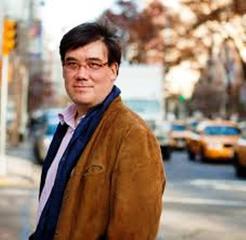|
Back
Maestro To Sage: “Shaw? Pshaw!” New York
Isaac Stern Auditorium, Carnegie Hall
11/24/2015 -
Robert Schumann: Overture to Manfred, Opus 115
Alban Berg: Three Pieces for Orchestra, Opus 6
Richard Wagner: A Ring Synthesis (Arranged by Alan Gilbert from Erich Leinsdorf’s symphonic synopsis)
Juilliard Orchestra, Alan Gilbert (Conductor)

A. Gilbert (© IMG Artists)
“Everybody enjoys the love music, the clumping giants, the woodman’s horn-tune, dragons, thunder and lightning...for play and pleasure. However, there is an inner ring of superior persons (and I profess to be one) for whom the whole work is urgent and socially significant.”
George Bernard Shaw, The Perfect Wagnerite
Richard Wagner didn’t see things that way (he was happy to have both orchestral and piano transcriptions to promote his operas), nor does Alan Gilbert. The Maestro conducts the operas, but he has taken one of the many orchestral “anthologies” (this one by Erich Leinsdorf), and last night gave us almost the full panoply from the last three operas in about 50 minutes.
His orchestra was not the usual NY Phil, but the Juilliard Orchestra, master students from our master music school. For their annual Carnegie Hall concert, Mr. Gilbert did not exactly make things easy. All three works he selected were difficult, challenging, and while they shared in the later German/Austrian Romantic period, the three languages were entirely different.
Certainly the most sumptuous piece was this Ring Synthesis. Five harps on the stage, a huge consort of brass, the full string section, an orchestra which, in quantity alone would have made Wagner proud. Qualitatively, the Juilliard Orchestra, with all the mastery of Alan Gilbert, still had its problems. Quite a few fluffs in the brass section, and ensemble which, in its totality, lacked the bite, that electric volition (what Shaw would have called “the Schopenhauer will”) to transcend the notes.
Compared to say, Lorin Maazel’s RingWithout Words–which gathered together virtually every popular theme in chronological order–Mr. Gilbert was lacking. He purposely omitted the prologue to the three Ring operas, so we didn’t have the rolling of the River Rhine or the famed clank of the anvils. But by starting with the Ride of the Valkyries, he brought the audience straight into the action.
“The Ride,” explained the conductor, “is so iconic it launches you into the world of Wagner in a way that’s more than easily graspable to pretty much everybody.”
True enough. So the G.B.S. dubious thesis, that the Ring is a metaphorical Marxist history of the world, was immediately put into the junkheap. (Nor, frankly, does it have much merit outside of Shaw’s glorious prose.)
Whatever the questions on transitions between the highlights, nobody could doubt the Juilliard’s playing of the Walhalla finale. Magnificent, eloquent–and not even Liszt would have dared make a transcription.
To change legends, Mr. Gilbert gave the Juilliard Orchestra an Augean Stable of challenges when choosing Alban Berg’s early Three Pieces. Somebody once said this 1915 work was “Mahler’s Eleventh Symphony,” and yes, there were countless Mahlerian close-references, martial moods (the whole last movement was a march of Mahler proportions, including the Drum of Doom), and chordal passages.
Mahler, though, composed the most dense passages with chamber-music transparency. Berg’s orchestration, though masterly, needs more than technical prowess. To their absolute credit, the Juilliard Orchestra essayed this with virtually no technical flaws (though we could have used an alto trombone for the high E-flat).
In fact, while Mr. Gilbert eliminated the opening of Ring, the start of the Berg had that same music rising out of the mists. Missing were the great climaxes which few professional orchestras can find. Yet the Juilliard worked well into the dances of the second movement, and Mr. Gilbert probably loved those three measures of waltz which disappear, like a guest at the wrong party.
The final march was played with martial furry. And while I don’t like singling out people, Brandon Ilaw wielded the heavy sledgehammer in five portentous notes.
Wagner was theater, Berg in his later operas would be more cinema. But Schumann was pure music. Though his Manfred was based on poetry, it had all the drama we wanted. The orchestra started off warily, but Mr. Gilbert soon got them in shape to do credit to the ultimate Romantic man and poet, Byron, and a composer who, excelled–like Wagner and Berg–in turning words into notes.
Mr. Gilbert–himself the director of conducting and orchestral studies at Juilliard–walked physically through the orchestra at the end, to thank as many as he could. It was a most meaningful and appreciated gesture.
Harry Rolnick
|